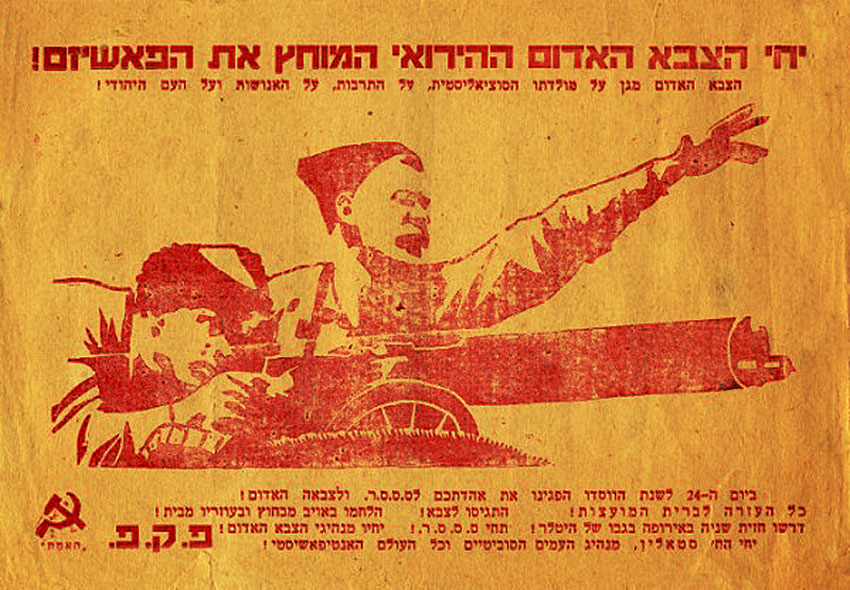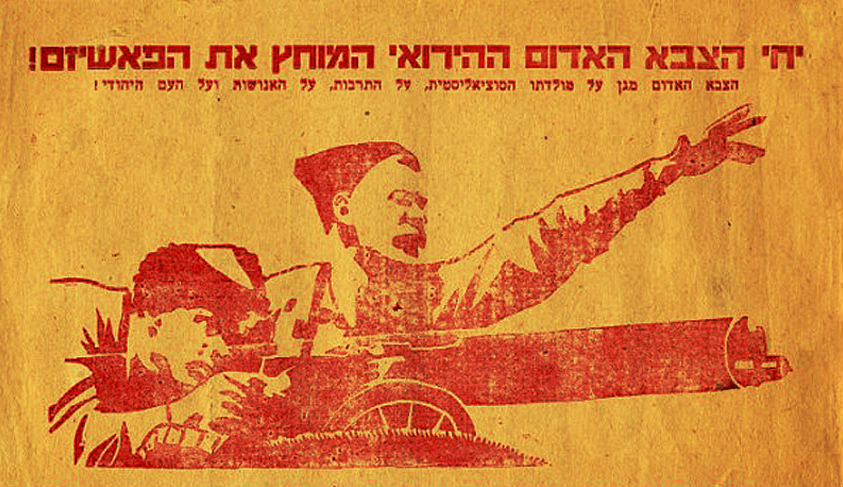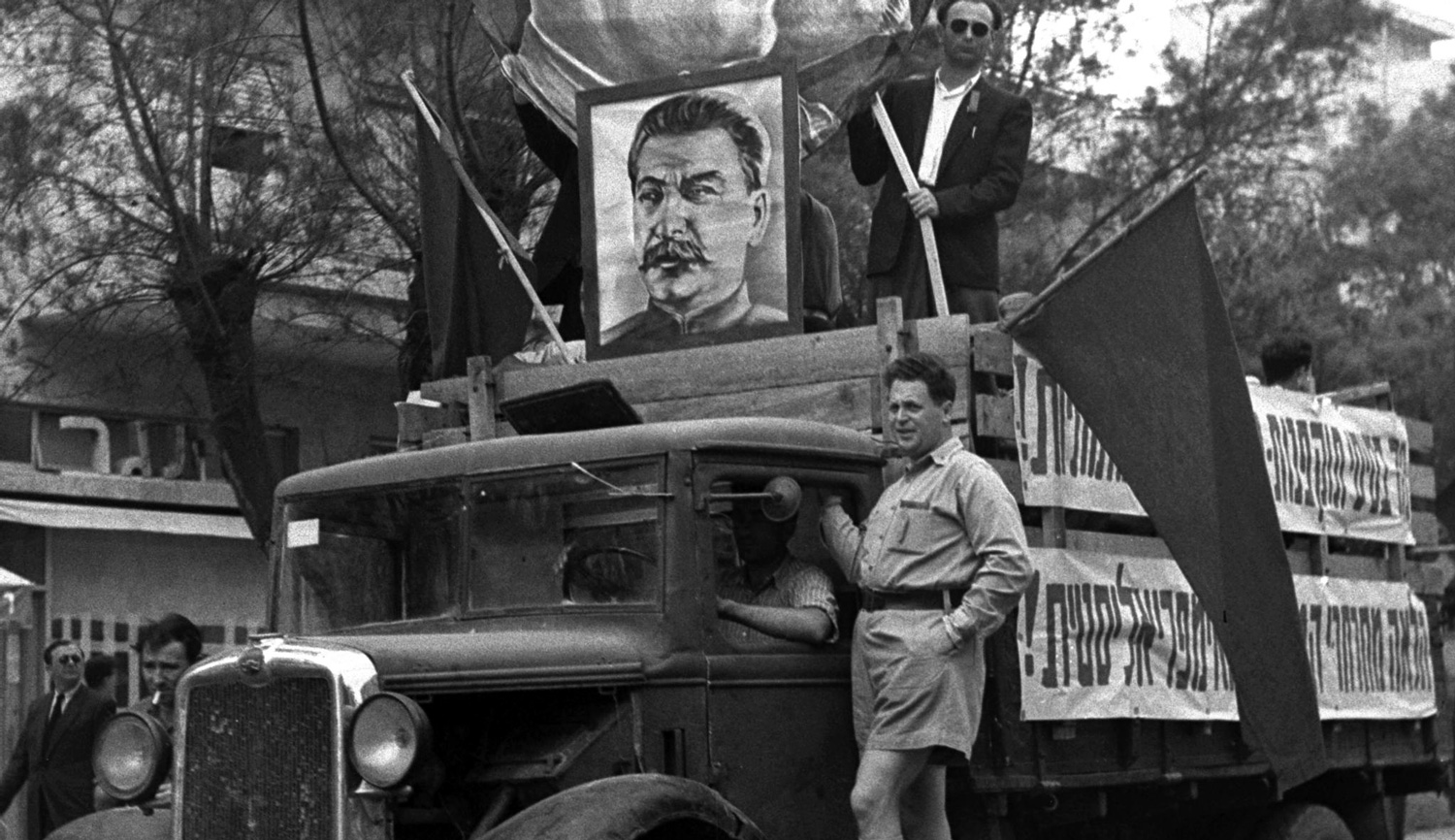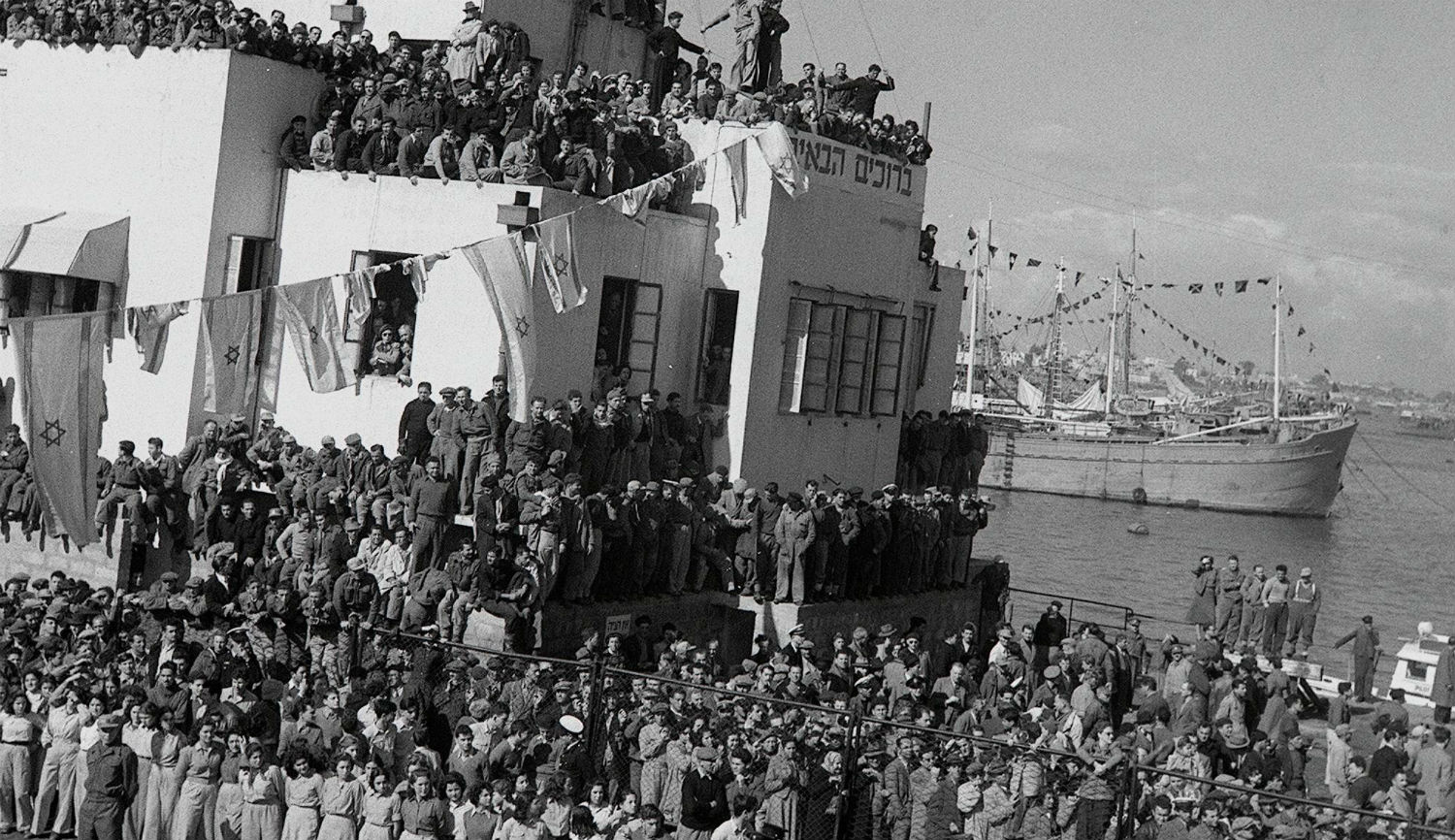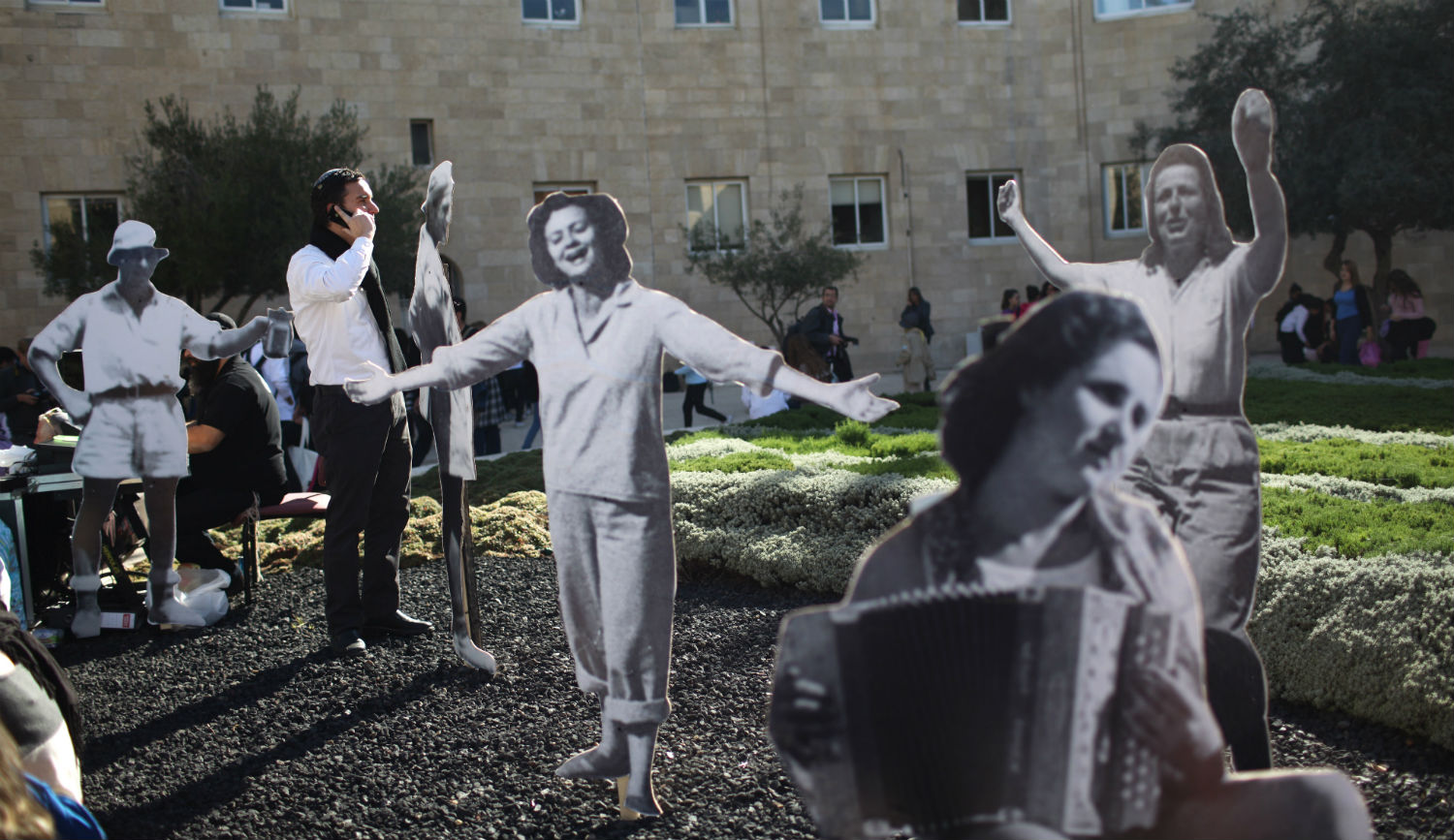One of the many virtues of Martin Kramer’s essay, “Who Saved Israel in 1947?” is its reminder of the decades of Communist hostility to Zionism both before and after the moment when, to the surprise of virtually everyone, the Soviet Union came out in favor of a Jewish state in Palestine and in November 1947 voted “yes” for the UN partition plan.
As Kramer notes, Soviet Foreign Minister Andrei Gromyko’s qualified support of Zionist aspirations in his May 14, 1947 speech at the UN was a startling repudiation of longstanding Soviet condemnations of Zionism as an especially pernicious form of bourgeois nationalism. Indeed, the USSR had outlawed Zionist activity ever since the early 1920s, applauded the Arab massacres of Jews in Palestine in 1929, and in the 1930s sponsored its own “Jewish homeland” in Birobidzhan.
Yet was the surprise warranted? When it came to Zionism, as Kramer shows, Stalin’s policies were driven less by visceral anti-Semitism than by calculations of Soviet interests. Despite his antipathy toward Jews, the Soviet dictator was quite capable of temporarily aligning himself with their interests in order to advance his own—and equally capable of reversing course on the same basis, as he would rapidly enough proceed to do.
In what follows I mean to discuss one of the effects of these sequential Soviet reversals: namely, their impact on Communist parties elsewhere. All such parties took direction from Moscow—until 1943 through the Communist International, or Comintern, and thereafter through the Soviet Communist party’s international department. Any shift in Soviet foreign policy required, and was met by, a conforming shift in the stated position of satellite parties around the world.
The two national parties most directly affected by Moscow’s sudden endorsement of a Jewish state were the diminutive Palestine Communist party (PCP) and the larger Communist party of the United States (CPUSA). In both, Jews were heavily represented; both briefly benefited from the Soviet turnaround in 1947.
The PCP had languished for years. Constantly pushed by the Comintern to recruit Arabs, constantly harassed by British Mandate authorities, and largely isolated from the broader Jewish community in Palestine, its ranks were further depleted by the departure of members to the USSR or Western Europe in search of more promising places in which to build Communism.
In 1945, a small dissenting section of the PCP, insisting that Jews were a people entitled to a national home in Palestine, split off to create the rival Hebrew Communists. When the USSR came out in favor of partition, however, the PCP, falling into line with Moscow’s decision, now joined with the Hebrew Communists (and an Arab splinter) to create a new entity, the Communist party of the Land of Israel (Maki)—which, after the establishment of Israel in May 1948, would elect four Communists to the first Knesset.
This was a high-water mark. By 1949, disillusioned by the USSR’s reversion to anti-Zionism, Eliezer Preminger, the second-youngest member of the first Knesset, left Maki, resurrected the Hebrew Communist party, and served as its lone representative before finally joining Mapam, the Marxist but formally non-Communist predecessor of today’s Meretz party.
Much more significant was the impact of the Soviet reversals on the fortunes of the CPUSA, which had always been hostage to Soviet dictates. In 1932, required by Moscow’s ultra-revolutionary policies to attack other radicals and socialists, the party had denounced Franklin Roosevelt as a fascist and opposed the New Deal, thereby destroying potentially useful alliances with otherwise sympathetic elements in, especially, the American labor movement. In 1939, after its four-year effort to repair this damage by helping to mobilize the Moscow-directed “Popular Front,” the party then endangered all of its new gains by obediently supporting Stalin’s pact with Hitler.
The CPUSA’s relations with the Jewish community were even more contentious. Although Jews were disproportionately represented in the party (forming about 40 percent of the membership by the 1930s), its activities had antagonized the overwhelming majority of American Jews. From anti-religious demonstrations in the 1920s, when young Jewish Communists would ostentatiously eat pork in front of synagogues on Yom Kippur, to the editorial acquiescence of the Communist Yiddish paper Freiheit in the 1929 “anti-imperialist” Arab massacres of Jews in Palestine, from the party’s defense of the 1939 Nazi-Soviet pact to its approval of the Soviet Union’s murder of the Bundist leaders Victor Alter and Henryk Ehrlich, the CPUSA was repeatedly censured by Jewish organizations and shunned as a pariah by most Jews.
Then—briefly—the wheel turned. The CPUSA emerged from World War II having amassed some measure of good will among American Jews. Not only had the Red Army borne the brunt of the fight to smash Hitler and save the remnant of European Jewry, but immediately after the war, as displaced and badly scarred survivors tried desperately to flee Europe, it was not the Soviet Union but Britain, America’s own great ally, that villainously kept the gates of Palestine closed.
True, by the end of 1947, as the cold war gathered steam, much of that good will was leaking away. Already under attack in Congress, where the Hollywood Ten had been cited for contempt, the CPUSA doubled down by adopting an even more militant posture. Breaking decisively with the Democratic party, it increased pressure on Henry Wallace to run for president as a left-liberal independent. Wallace had served as vice president in FDR’s third term; in 1946, as the holdover Secretary of Commerce after FDR’s death, he was forced out of Truman’s cabinet for opposing a tougher policy toward the USSR.
It was in this swirl of events that the Soviet Union abruptly revealed its intention to support the UN partition proposal and the creation of a Jewish state in Palestine. The CPUSA scrambled to follow suit, and so did Wallace, who, in faithfully lauding the Soviet move, seized the chance to vilify America’s alliance with “imperialist” Great Britain.
The Truman administration also endorsed partition in November 1947, if over the strenuous objections of Secretary of State George Marshall and other officials. Only a month later, however, Washington signaled misgivings: Marshall announced that the United States had accepted the UN’s call for an arms embargo in the Middle East—essentially, on the nascent Jewish state—even as Britain continued to arm Arab states that were threatening to destroy it as soon as it came into existence.
Against this turbulent background, the Communist and non-Communist left glimpsed a window of opportunity. A local New York City contest for a vacated seat in Congress provided an occasion for testing the electoral power of a party line that now included support for a Jewish state. In a heavily Jewish congressional district in the Bronx, the incumbent Democrat had resigned, and a special election was set for February 17, 1948.
In New York, the American Labor party (ALP), created by the largely Jewish garment workers’ unions to enable their socialist-leaning members to support FDR without having to vote for Tammany Hall Democrats, but by now infiltrated and largely taken over by the CPUSA, was preparing to give its line on the 1948 presidential ballot to Wallace. (The ALP, despite its national name, was active almost exclusively in the state of New York.) Now, for the vacant seat in Congress, the ALP nominated Leo Isaacson, a young attorney who had served one term in the State Assembly for the party and then lost a bid for borough president.
Close to the CPUSA, but not a party member, Isaacson was at once an ardent Zionist and a fierce critic of the Marshall Plan for the reconstruction of war-torn Europe, castigating the Truman administration for “attempt[ing] to drag fascism in by the back door.” In the run-up to the February voting, he now hammered away at the administration’s alleged betrayal of the Jews. Accusing Truman of cozying up to feudal Arab warlords and the oil lobby, he demanded a lifting of the arms embargo and full support for partition and the creation of a Jewish state.
A year earlier, prior to Gromyko’s speech, American Communists would have shied away from such full-throated support of Zionism. But now they loudly endorsed both it and Isaacson. Party cadres were dispatched to the district to canvass door-to-door, to organize rallies, and to hand out literature. Wallace, who campaigned with Isaacson—his own support for the arms embargo going discreetly unmentioned—warned ominously that Truman “talks Jewish but acts Arab.” Party allies like the singer Paul Robeson, the popular ALP politician Vito Marcantonio, and the union boss Michael “Red Mike” Quill endorsed Isaacson’s candidacy over his Democratic rival, who for his part could claim the no less formidable support of both Eleanor Roosevelt and New York Mayor William O’Dwyer.
The results were a shock. Isaacson won in a landslide, receiving 22,700 votes to the Democrat’s 12,500; bringing up the rear were the Liberal party, formed by union leaders unhappy over the Communist role in the ALP, and, of course, the Republicans. Stunned Democrats now began to worry about Truman’s prospects come November, while the emboldened Henry Wallace, who would eventually become the nominee of the Progressive party, predicted that his “Gideon’s Army” would shake up the political establishment.
The CPUSA was ecstatic. Hoping that Isaacson’s victory presaged a substantial vote for Wallace, it ignored warnings from its own labor leaders that its support of Wallace, instead of retarding or derailing the country’s growing anti-Communist sentiment, might well exacerbate it. The labor leaders proved right. In May, rejecting the advice of Secretary of State Marshall, President Truman quickly extended de-facto American recognition to the new state of Israel, undercutting the CPUSA’s hopes that large numbers of American Jews would abandon the Democratic party and rush to embrace Wallace.
To be sure, Truman’s decision to recognize Israel was hardly the only or even the most important factor in Wallace’s dismal performance in November. His own incompetence, the increasingly clear indications of Communist control of the Progressive party, and the developing cold war all contributed. Wallace won only 1.1 million votes or 2.37 percent of the ballots cast, finishing well behind the Dixiecrat Strom Thurmond. As for Isaacson, his tenure in Congress was short-lived; Republicans, Democrats, and Liberals came together to field a candidate who in the 1948 general election trounced him by 74,000 to 44,000 votes.
The Progressive party of 1948 represented the last gasp of the CPUSA and its allies in American political life. Soon after the election, the Council of Industrial Organizations began efforts to expel Communist-dominated unions from its ranks, destroying one of the last bastions of party influence. Even Isaacson and Wallace soon defected, in both cases over the CPUSA’s pro-Soviet position on the war in Korea.
As for the new Soviet line on Zionism, that was fleeting as well. As Martin Kramer records, Stalin was evidently horrified by the huge numbers of Soviet Jews who in September 1948 turned out to greet Golda Meir, Israel’s first ambassador to the USSR, at a Moscow synagogue. By 1949 attacks on Yiddish culture, arrests of prominent Jewish intellectuals associated with the World War II-era Jewish Anti-Fascist Committee, and denunciations of “rootless cosmopolitans” were the prelude to a violent, full-scale anti-Semitic campaign that ended only after Stalin’s death in 1953.
Both Maki and the CPUSA continued to hemorrhage Jewish members and sympathizers. Neither one ever became a significant political force.
More about: History & Ideas, Israel & Zionism
